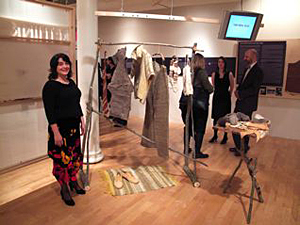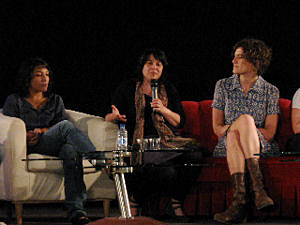
ADVERTISEMENT
- Rozovsky wins prestigious NSF Early Career Award
- UD students meet alumni, experience 'closing bell' at NYSE
- Newark Police seek assistance in identifying suspects in robbery
- Rivlin says bipartisan budget action, stronger budget rules key to reversing debt
- Stink bugs shouldn't pose problem until late summer
- Gao to honor Placido Domingo in Washington performance
- Adopt-A-Highway project keeps Lewes road clean
- WVUD's Radiothon fundraiser runs April 1-10
- W.D. Snodgrass Symposium to honor Pulitzer winner
- New guide helps cancer patients manage symptoms
- UD in the News, March 25, 2011
- For the Record, March 25, 2011
- Public opinion expert discusses world views of U.S. in Global Agenda series
- Congressional delegation, dean laud Center for Community Research and Service program
- Center for Political Communication sets symposium on politics, entertainment
- Students work to raise funds, awareness of domestic violence
- Equestrian team wins regional championship in Western riding
- Markell, Harker stress importance of agriculture to Delaware's economy
- Carol A. Ammon MBA Case Competition winners announced
- Prof presents blood-clotting studies at Gordon Research Conference
- Sexual Assault Awareness Month events, programs announced
- Stay connected with Sea Grant, CEOE e-newsletter
- A message to UD regarding the tragedy in Japan
- More News >>
- March 31-May 14: REP stages Neil Simon's 'The Good Doctor'
- April 2: Newark plans annual 'wine and dine'
- April 5: Expert perspective on U.S. health care
- April 5: Comedian Ace Guillen to visit Scrounge
- April 6, May 4: School of Nursing sponsors research lecture series
- April 6-May 4: Confucius Institute presents Chinese Film Series on Wednesdays
- April 6: IPCC's Pachauri to discuss sustainable development in DENIN Dialogue Series
- April 7: 'WVUDstock' radiothon concert announced
- April 8: English Language Institute presents 'Arts in Translation'
- April 9: Green and Healthy Living Expo planned at The Bob
- April 9: Center for Political Communication to host Onion editor
- April 10: Alumni Easter Egg-stravaganza planned
- April 11: CDS session to focus on visual assistive technologies
- April 12: T.J. Stiles to speak at UDLA annual dinner
- April 15, 16: Annual UD push lawnmower tune-up scheduled
- April 15, 16: Master Players series presents iMusic 4, China Magpie
- April 15, 16: Delaware Symphony, UD chorus to perform Mahler work
- April 18: Former NFL Coach Bill Cowher featured in UD Speaks
- April 21-24: Sesame Street Live brings Elmo and friends to The Bob
- April 30: Save the date for Ag Day 2011 at UD
- April 30: Symposium to consider 'Frontiers at the Chemistry-Biology Interface'
- April 30-May 1: Relay for Life set at Delaware Field House
- May 4: Delaware Membrane Protein Symposium announced
- May 5: Northwestern University's Leon Keer to deliver Kerr lecture
- May 7: Women's volleyball team to host second annual Spring Fling
- Through May 3: SPPA announces speakers for 10th annual lecture series
- Through May 4: Global Agenda sees U.S. through others' eyes; World Bank president to speak
- Through May 4: 'Research on Race, Ethnicity, Culture' topic of series
- Through May 9: Black American Studies announces lecture series
- Through May 11: 'Challenges in Jewish Culture' lecture series announced
- Through May 11: Area Studies research featured in speaker series
- Through June 5: 'Andy Warhol: Behind the Camera' on view in Old College Gallery
- Through July 15: 'Bodyscapes' on view at Mechanical Hall Gallery
- More What's Happening >>
- UD calendar >>
- Middle States evaluation team on campus April 5
- Phipps named HR Liaison of the Quarter
- Senior wins iPad for participating in assessment study
- April 19: Procurement Services schedules information sessions
- UD Bookstore announces spring break hours
- HealthyU Wellness Program encourages employees to 'Step into Spring'
- April 8-29: Faculty roundtable series considers student engagement
- GRE is changing; learn more at April 15 info session
- April 30: UD Evening with Blue Rocks set for employees
- Morris Library to be open 24/7 during final exams
- More Campus FYI >>
8:46 a.m., Nov. 30, 2009----Kelly Cobb, an instructor in the Department of Fashion and Apparel Studies at the University of Delaware, has been promoting sustainable fashion initiatives in both the local community and around the world, through her 100-mile suit project and an appearance at the 2009 Ethical Fashion Show in Paris.
Cobb said it is important to maintain sustainability in the fashion and apparel industries because it positively impacts all people in the value chain from workers to consumers, maintains the environment for future generations, and results in a more productive and viable company.
Cobb is one of several UD faculty members who contribute to the University of Delaware Sustainable Apparel Initiative.
The 100-mile suit
Cobb was fascinated by the concept of accomplishing a feat within a 100-mile radius, such as the 100-mile diet. With her background in textiles, she asked herself, “What can I do in my field to experiment with this concept? Is this even possible?”
With that question in mind, and wanting to become more involved in the production of clothing, she gave herself a challenge in 2006 to create the 100-mile suit: an outfit made of materials raised, processed, produced and constructed within a 100-mile radius of a given location. In this case, the location was Philadelphia.
The suit, which was completed in 2007 and has been toured across the country since then, is currently included in an exhibit at the Pratt Manhattan Gallery in New York entitled “Ethics and Aesthetics: Sustainable Fashion.” The exhibit showcases both practical and symbolic solutions to the question of integrating sustainable practices into the fashion industry, and it runs until Feb. 20, 2010.
With her interest in labor in the fashion industry, Cobb said she wanted to know how many different hands would have to touch the suit from when its beginning as a strand of fiber until the moment the final product was created.
It turned out that the suit became a collaboration of 25 people from Maryland, Pennsylvania and New York who volunteered 506 hours to complete the final product, she said. Ninety-two percent of the suit was produced within a 100-mile radius of Philadelphia. The only parts of the suit that weren't produced within the radius were industrially manufactured yarn for the warp, threads, laces, cushion cork and insoles.
While Cobb said the suit would not be able to be mass produced or seen in stores any time soon, the primary objective of the project was a great achievement.
“As a suit, the garment is not a success, but the project was really about creating a tangible signature from within a community,” she said. “It was a real community affair.”
Cobb has maintained a blog about the 100-mile suit, which features a video that traces many elements of the suit to its origins.
Cobb's trip to Paris
Cobb has spread the importance of ethics and sustainability in the fashion industry around the world, as she spoke about ethical sourcing in the fashion industry at the 2009 Ethical Fashion Show, which took place Oct. 1-4 at the Tapis Rouge in Paris.
Cobb's lecture, entitled “Ethical Fashion from Design to Production,” dealt with what it means to create an ethical garment. There are many issues at hand in order to create an ethical garment, Cobb said, including the conditions of workers from crop to shop, the use of non-toxic dyes or excessive usage of materials.
One of the problems presented in the fashion industry, Cobb said, is the idea of green-washing, when manufacturers use the term “green” to sell a product, while in reality the product is not produced ethically.
“The intention is to formulate a garment and add up all the processes that are required to make it,” she said. “If we are putting our money into production, we should know how materials were grown and the treatment of the workers who made the garments. Consumers are already putting money in production, so they can choose to see where their money is going, or they can continue to consume.”
Cobb said her visit to France was made to step outside the domestic conversation and connect with educators and designers in the industry to discuss the continuing project of combining sustainability and profit. The Ethical Fashion Show featured some of biggest names in sustainable fashion.
She stressed the importance of having an American presence at the international conference, as she noted that Europe is about five years ahead of the U.S. regarding the practice of sustainability in fashion.
“We are really a part of the making and creation of a sustainable fashion practice here in the States,” she said. “There is no such thing as eco-fashion, but in the end, the customer has the buying power and can decide whether to buy more or consume less.”
Article by Jon Bleiweis



